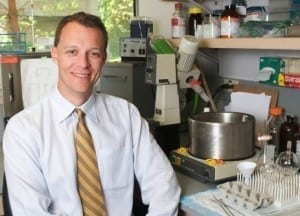
Infertility can be a physically, emotionally, and financially painful experience for couples wanting to have biologically-related children. If a couple has been unable to conceive naturally in a 12-month period, they are considered infertile. Next steps are typically expensive and painful tests for women to determine the cause of the problem, before a couple pursues assisted reproductive technology such as IVF and IUI.
But all that may change thanks to newly minted UWSOP alumnus and physician John Amory, ’17 and his master’s thesis work with Nina Isoherranen. Working with graduate student Faith Stevison, the team found a major breakthrough in men’s fertility.

Ironically, the breakthrough came from John’s research into a male contraceptive medication. After years of researching how to reduce sperm counts, John hypothesized that perhaps there was a way to increase sperm counts. He decided it was time to research in-depth and enrolled in the Pharmaceutics master’s degree program. “If you are retinoic acid or Vitamin A deficient, male fertility is suppressed,” said Nina. “John hypothesized that if he could find a drug to increase intratesticular retinoic acid, it would increase men’s sperm counts and thereby the chance of conception.”
It turns out there is an FDA-approved drug, Accutane, a prescription acne medication, that is a retinoic acid isomer and increases retinoic acid concentrations and men’s sperm counts.
For his Pharmaceutics thesis research, John obtained an Investigational New Drug (IND) from the FDA to test his theory that Accutane could be used to treat male infertility by increasing sperm counts. Early results are very promising. From his pilot group of 19 men there are now five babies: three from spontaneous pregnancies and two from assisted conception (one additional pregnancy did not come to term).
“The fact that we were able to overcome male infertility for six men in our small sample group, using a medication that is already on the market, shows great promise for couples wishing to conceive.”
–Dr. John Amory, ’17, M.S., Pharmaceutics alumnus
John wants to conduct further research to understand better why this drug intervention did not work for about a third of the patients. “There are no obvious reasons why it didn’t work in terms of ethnicity, age, weight or other common indicators,” he said, “so I am curious if there are other markers that might explain why.” His research has been accepted for publication and he plans to pursue a double blind placebo study to confirm the pilot test findings.
John said earning his master’s in Pharmaceutics changed how he practices medicine and thinks about research. “I know a lot more about drug interactions than I did before, even as a seasoned physician. I have a greater appreciation for how hard it is to make a drug and bring it to market. We tend to take medications for granted,” he continued, “but there is a saying: ‘the miraculous nature of the mundane.’ To me, the idea you can take something as mundane as a pill and use it to treat a symptom or cure a disease—that’s a miracle.”
John’s breakthrough findings have the promise of alleviating financial, emotional, and physical stress for many couples wanting to grow their families. If the early pilots bear fruit, the tests and treatment for male infertility could drastically reduce the costs and radically improve outcomes for fertility treatment.
To study with leaders in Pharmaceutics like Dr. Nina Isoherranen, click on the link for more information about our PhD Program in Pharmaceutics.